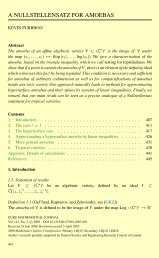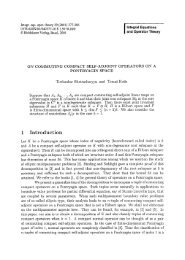Молодой учёный
Молодой учёный
Молодой учёный
Create successful ePaper yourself
Turn your PDF publications into a flip-book with our unique Google optimized e-Paper software.
336 Государство и право<br />
«<strong>Молодой</strong> <strong>учёный</strong>» . № 5 (40) . Май, 2012 г.<br />
– other specific laws, including Federal Law No. 213-FZ<br />
dated 27 December 1995 ‘On the State Order for Defense’,<br />
Federal Law No. 79-FZ dated 29 December 1994 ‘On State<br />
Material Reserves’, Federal Law No. 60-FZ dated 13 December<br />
1994 ‘On Supplies for Federal Government Needs’,<br />
Federal Law No. 53-FZ dated 2 December 1994 ‘On the<br />
Procurement and Delivery of Agricultural Goods, Raw Materials<br />
and Commodities for State Needs’, which govern the<br />
procurement of specific types of goods.<br />
Within the framework of the Public Procurement Law and<br />
in the cases specified therein, the president, the government<br />
of the Russian Federation and the Ministry of Economic Development<br />
of the Russian Federation, as an authorized government<br />
body responsible for normative legal regulation of<br />
public procurement, may all issue respective regulations.<br />
The Public Procurement Law is enforced by the state arbitration<br />
courts, which are part of the state court system in Russia<br />
and deal with the resolution of economic disputes, and state<br />
courts of general jurisdiction in disputes with the participation<br />
of individuals.<br />
Supervision over public procurement, except for control<br />
over the state order for defense, is exercised at federal level<br />
by the Federal Antimonopoly Service of the Russian Federation<br />
(hereinafter the FAS), and at the level of the constituent<br />
entities of the Russian Federation or the local municipal authorities<br />
by the respective authorized supervisory agency. A<br />
lawsuit challenging the validity of a decision issued by the<br />
contracting authorities can be filed by a ‘participant in the<br />
placement of an order’ (bidder) and the FAS or other authorized<br />
supervisory agency.<br />
In April 2011 the legislative authority of the Russian Federation<br />
is considering amendments to the Public Procurement<br />
Law related to the procedure for determining the initial<br />
contracting price. If the proposed amendments are adopted,<br />
all state (municipal) customers will be obliged to indicate in<br />
the auction documentation the base for calculating the initial<br />
price and the calculation itself. The initial price shall be<br />
determined on the basis of publicly available sources (state<br />
statistical information, market research, information from<br />
previously concluded state (municipal) contracts, etc.). The<br />
government of the Russian Federation will be entitled to establish<br />
the methodology for calculating the initial price and<br />
limits on the sources for calculating the price for some goods.<br />
Additionally, as of February 2011 two further draft laws that<br />
introduce amendments to the Public Procurement Law had<br />
been developed by the FAS and by the Ministry of Economic<br />
Development, respectively. The proposed amendments<br />
drafted by the FAS focus on the following issues:<br />
– Exclude the request for price quotations as a form for<br />
placing orders. As an alternative a so-called ‘short auction’<br />
form should be used, which should be completed within<br />
seven days of the announcement date;<br />
– Establish annual limits for all customers on consumer<br />
goods such as cars, furniture etc. (especially, premium class<br />
goods) as a way of reducing corruption in public administration;<br />
– It is possible that the application of the breach of order<br />
placement procedure (see question 36) will be subject to the<br />
payment of state duty. Such applications should be filed online.<br />
The amendments prepared by the Ministry of Economic<br />
Development are still being elaborated, but should be made<br />
publicly available in May 2011. Based on several interviews<br />
with state officials, the Ministry of Economic Development of<br />
the Russian Federation has drafted a completely new law that<br />
will replace the existing Public Procurement Law.<br />
From 1 January 2011 all state and municipal customers<br />
are obliged to place all procurement orders for goods, work<br />
and services specified by the government of the Russian<br />
Federation in public e-auctions. The announcements of<br />
all procurement orders for goods, work and services shall<br />
be accumulated on one official website [4]. As at February<br />
2011, 68 percent of all state and municipal customers are<br />
registered on this website and place information about orders<br />
here. In the meantime, eligible electronic trading platforms<br />
(to conduct electronic auctions) have been selected<br />
by the Ministry of Economic Development of the Russian<br />
Federation together with the FAS. As at January 2011 the<br />
total number of active electronic trading sites has been reduced<br />
to five [4, 5]. Due to the trend of enhancing transparency<br />
and reducing corruption in the area of procurement,<br />
administrative sanctions (the maximum amounts of fines<br />
imposed on operators of e-auctions and state and municipal<br />
customers) have been increased for various violations<br />
of the Public Procurement Law. To participate in an electronic<br />
auction, a supplier should be duly registered on the<br />
appropriate electronic trading site (from the five mentioned<br />
above). For registration purposes, the supplier should obtain<br />
an electronic digital signature and receive accreditation<br />
on the trading site. In practice these requirements can<br />
be met either by a Russian legal entity or by the representative<br />
office (or branch) of a foreign legal entity, and not by the<br />
foreign legal entity itself.<br />
Thus, today more than ever, the government must ensure<br />
that it spends money wisely and eliminates waste and<br />
abuse of taxpayer dollars. With more than one out of every<br />
six dollars of Federal government spending going to contractors,<br />
it is imperative that contract actions result in the best<br />
value for the taxpayer. The Office of Federal Procurement<br />
Policy (OFPP) in the Office of Management and Budget<br />
plays a central role in shaping the policies and practices federal<br />
agencies use to acquire the goods and services they need<br />
to carry out their responsibilities.<br />
As for USA, Federal procurement generally requires competitive<br />
bidding on contracts which exceed a certain monetary<br />
threshold. In these instances, a request for proposal<br />
(RFP) is issued with specific guidelines, and bids are submitted<br />
for review. The contract is generally given to the bidder<br />
which can meet all of the required specifications at the lowest<br />
price. Exemptions to this policy can occur in cases where only<br />
one source of supply exists, or when one supplier has proven<br />
to be far superior in performance to the others. In Canada,<br />
the governmental body primarily responsible for federal pro-

















